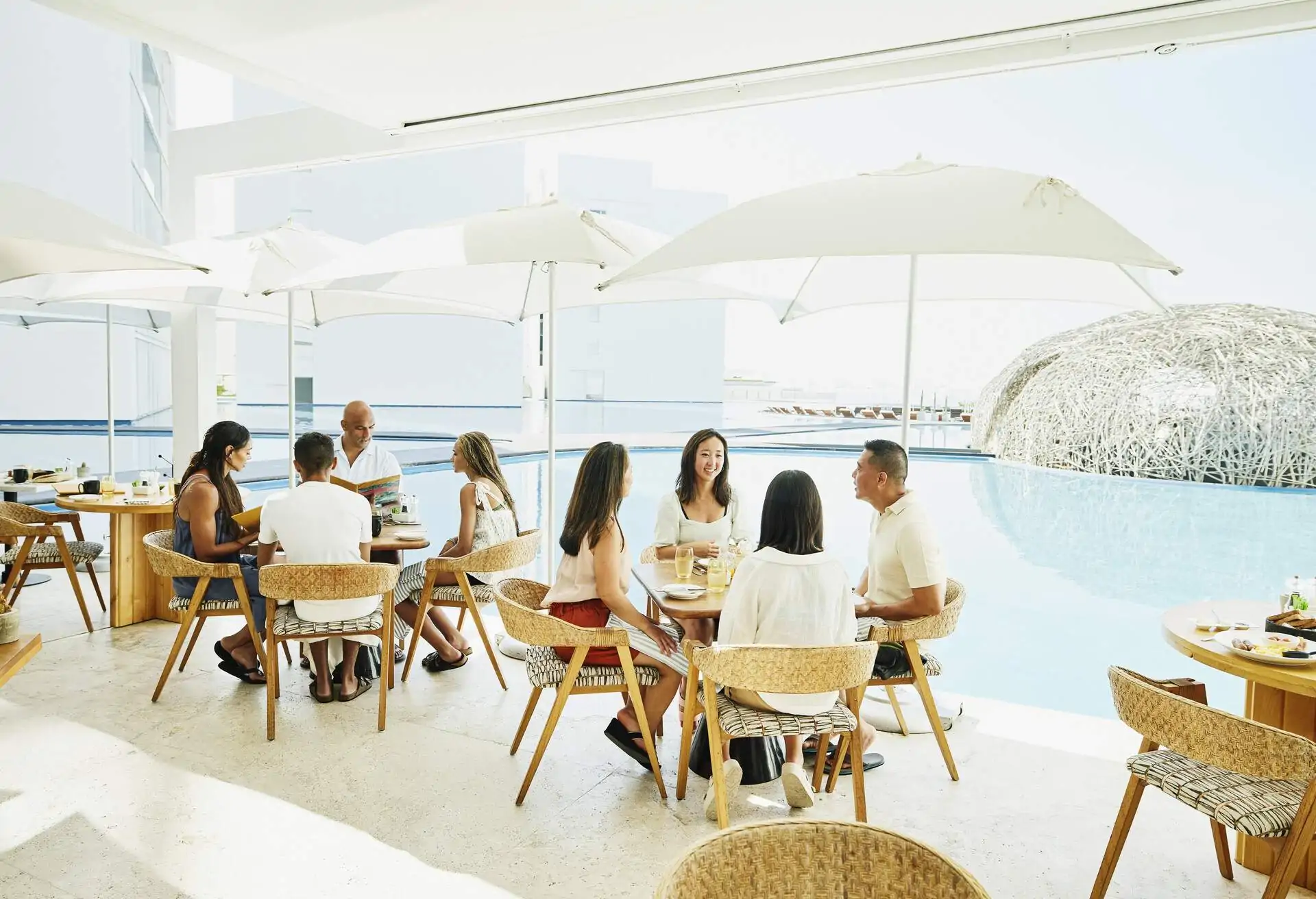Hotels can’t just rely on comfy beds and sleek lobbies to court guests. With so many accommodation options out there, properties need a hospitality experience worth booking for. That’s where hotel restaurants come in. Being able to deliver craveable dishes, buzzy atmospheres and the kind of memorable dining experiences that keep guests coming back again and again can give your property the edge.
Don’t think of your hotel restaurant as just another amenity. When operated effectively, these establishments are major revenue drivers (and award winners) with the power to shape your reputation, enhance guest satisfaction and even attract locals to your property for a taste of the action.
In this guide, we explore all the reasons why hotels should be prioritising their restaurant and sharing strategies so you can reach your full potential.
Quick links:
- The elevated dining experience
- Diversifying revenue streams
- Attracting local diners
- Setting culinary trends
- Operational best practices
- Case studies: get inspired
The elevated dining experience
Let’s start with the obvious: hotel guests crave convenience and an elevated experience across every aspect of their stay. That’s exactly what an exceptional hotel restaurant delivers in one fell swoop.
Rather than forcing travellers to navigate unfamiliar areas hunting for quality dining each day, hotels can provide convenient, craveable food on their own premises that exceeds expectations. A pleasant setting, creative menus developed by acclaimed chefs and a level of hospitality that makes guests feel like VIPs—these are the kinds of elevated touches hotel restaurants provide.
Diversifying revenue streams
While wowing guests is reward enough, hotel restaurants crucially provide properties a valuable additional revenue stream beyond just room fees. And as visitor demand shifts between high and low seasons, these food and beverage profits become even more important for balancing earnings.
How big of an impact can hotel restaurants make? Research shows that a well-run hotel with a restaurant can see its eatery account for about 20% of revenue—a significant number that contributes to the bottom line.
It’s not just captive guest spending, either. Unlike hotel gift shops or in-room dining programs, restaurants can effectively market to locals and travellers to drive consistent non-guest covers. That requires restaurants with creative concepts and strong marketing.
Properties that treat their hotel restaurant operations as true revenue generators rather than amenities can significantly increase guest spend across the board.
Attracting local diners
Speaking of drawing non-guest diners. Effective hotel restaurants use strategic marketing to position themselves as must-visit dining destinations that attract a steady flow of locals and other travellers in addition to overnight guests.
OpenTable’s vast network of verified diners and booking capabilities makes it easy for hotel restaurants to get their names out there. Properties can promote everything from happy hour specials to lavish tasting menus through custom-tailored email campaigns and Experiences to give guests unique and memorable dining moments.
This integrated marketing approach combined with a creative hook is incredibly powerful for driving major awareness and repeat visits from locals and visitors alike. Maybe it’s Michelin-starred chefs or innovative cuisine celebrating regional flavours. Or perhaps it’s weekly themed events, special holiday menus or an aesthetic setting like sweeping waterfront views.
Regardless of the specific angle, hotels can make their restaurant a true calling card that brings sophisticated diners to their doorstep again and again. Not only does this tap new revenue sources, it enhances the property’s reputation as a must-visit hospitality destination.

Setting dining trends
Speaking of cultivating enviable reputations, hotels that invest in creating truly standout restaurant offerings position themselves as genuine trendsetters in their local markets and beyond.
With the right backing, hotel restaurants have major flexibility to get creative and experimental with their cuisine in ways that make them dining pioneers for larger movements. From trailblazing new genre mashups or championing emerging ingredients to avant-garde presentations, hotels provide the perfect platform.
One prime example could be a plant-based cuisine and menu celebrating locally-grown seasonal produce. As conscious consumption and sustainable sourcing go mainstream, a hotel restaurant could be at the forefront elevating these concepts with innovative tasting menus and a renewed focus on agricultural storytelling.
Even simpler trends like themed dessert tastings or zero-proof craft cocktail explorations often find early adopters and major acclaim within forward-thinking restaurants willing to set the tone for future dining habits. There’s no reason why a hotel restaurant can’t adopt a similar trend.
At the end of the day, the hotel restaurants committed to charting new territory are the ones being celebrated by media outlets and industry insiders. And that kind of influential buzz drives tons of value for the property.
Operational best practices
Of course, those praise-worthy movements and innovative dining experiences don’t emerge without steadfast operational fundamentals and seamless integration with the larger hotel operations.
Here’s a quick checklist for hotel restaurants to optimise their offerings:
Staffing and training
Attracting and retaining top talents is priority number one. From lucrative career paths and benefits packages to rigorous, standardised training for delivering consistently excellent service—hotel restaurants must invest in their people to succeed. Empowered staff are essential.
Technology and systems integration
Running a hotel restaurant requires management platforms that look after everything from reservations to restaurant marketing and table management.
Menu and concept strategy
Menus should be designed by chefs and consultants with an eye toward seasonality, local flavours and even unique themes—whatever hooks will attract diners. Offering convenient suite menus and amenities for in-room dining is smart too.
Marketing and promotions
With a standout dining concept and menu program in place, integrated marketing is key to promoting your restaurant and letting outside guests know they can book a table.
Reporting and analytics
Hotels should leverage restaurant analytics tools to forecast dining revenues, streamline purchasing, optimise promotional cadences, identify guest behaviour trends and more to continuously refine operations.
Adherence to brand standards
Maintaining pristine presentations and service protocols reflective of the hotel brand’s luxury standards across all restaurant facets from uniforms to plating is non-negotiable for building long-term value.
Case studies
Ready to see hotel restaurants effectively putting all these strategies into action? Check out how the Edwardian uses its restaurant to enhance the overall appeal of the hotel.
Edwardian
The Edwardian Hotel Group stands out for its commitment to operating exceptional hotel restaurants across properties in prime locations like central London and Manchester. It prioritises both outstanding dining experiences and uses smart technology to achieve a high standard of service.
A long-standing partnership with OpenTable allows The Edwardian’s restaurants, such as the acclaimed Peter Street Kitchen and Leicester Square Kitchen, to maximise reservation channels, analyse diner data for personalised service and execute creative marketing promotions that drive consistent covers.
By tapping into OpenTable’s vast diner network for exposure, customisable options for Experiences and insights from the Pro plan’s booking trends, The Edwardian stays ahead of the curve. Its five-star hotels offer sought-after dining, and it’s able to offer both experiences either combined or separate without compromising on quality.
Being on OpenTable increases our reach, as it’s the biggest platform out there for restaurants
says Sheetal Varia, Head of Operations at Edwardian Hotel Group
The Edwardian’s commitment to hospitality boosted by strategic tech integration creates memorable dining destinations worthy of acclaim.
Summary: hotel restaurant power-up
Whether embracing cultural heritage or championing emerging trends, hotels able to successfully transform their restaurants into buzzworthy dining destinations elevate themselves to new levels of prestige and profitability.
That requires consistent creativity, meticulous execution and taking advantage of technology like OpenTable to streamline every component from reservations to staffing to marketing. But for hotels that get it right, the payoff is an unbeatable edge and very full dining rooms.




